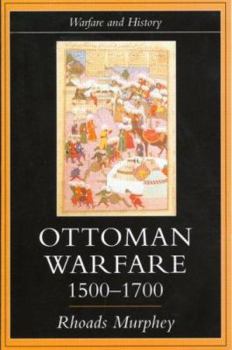Book Overview
Ottoman Warfare is an impressive and original examination of the Ottoman military machine, detailing its success in Europe, North Africa, and the Middle East. Focusing primarily on the evolution of... This description may be from another edition of this product.
Format:Paperback
Language:English
ISBN:1857283899
ISBN13:9781857283891
Release Date:November 1998
Publisher:Routledge
Length:304 Pages
Weight:0.90 lbs.
Dimensions:0.6" x 6.0" x 9.0"
Related Subjects
16th Century 17th Century Europe History Middle East Military Modern (16th-21st Centuries) TurkeyCustomer Reviews
3 ratings
A Military history that actually looks at the military
Published by Thriftbooks.com User , 15 years ago
Rhodes Murphey produced a nice narrative on Ottoman warfare from 1500-1700. The book pays a great deal of attention to the logistical side of warfare. He tries to combat the idea that the Ottomans were technologically superior during the period. Weaponry was quite similar, and the Ottomans were able to outnumber and defeat either weak powers or wanning powers. They were unable to succeed in open sea warfare against Portuguese galleons, and their navy was very weak. Murphey suggests this is clearly the result of expense; thus, it was too expensive to man and outfit a fleet of war ships. The Ottomans were a land army, and one of their major strengths was their logistics and standing army. However, the standing army was also a plague for the Ottomans as it sucked a great deal of money from the treasury. The Janissary corps, though very good, probably hurt the state more than it helped. They were very expensive, and hardly made up the majority of any army on any campaign. Just to play the devils advocate for a moment. The Ottoman army was large in number, and had some very good untis. However, there defeat of Constantinople was not all that impressive. The Greeks were a wanning power, and the city was hardly defended. When the Ottomans faced more western powers they were soundly defeated...hence the Portuguese Galleons easily out maneuvered and destroyed the Ottoman gallies. This seems to come out in the book, that is the invulnerability and deep weakness of the ottomans. They had a very good system in place, the weapons to match any European power (excluding the navy), and the money to do so. It seems that Murphey brings the Ottoman military downa few knotches; they were not that unstobable. It reminds me of the romanticized view one takes of the British army in the 18th century, and how the native American's were able to out manuever and defeat them...yet one forgets that the British army was pathetic compared to the continental powers, so in reality the native feat was not all that impressive. I am not suggesting the Ottoman military was pathetic or that Rhodes feels the same way--only that he brings forth several problems and debunks a few "myths".
Remarkable masterpiece
Published by Thriftbooks.com User , 24 years ago
Murphey should get an astounding applause for his work. There is an incredible appeal that 'drains' you right into the pages of endless original arguments. The Ottoman Devlet (not Empire if you read the book carefully, I borrowed Maksudoglu terms for the Ottoman) finally received a fair judgement for their history. The research was acurately done with rare details, those which never surfaced before, which cleared out any pontless subjectivity mostly found on previous studies of the Ottomans. 'The sick man' was made 'sick' in the first place.The rationalization of the Ottoman military might was the best part in the book. I am not surprised if this work becomes a classic.
Best study of Ottoman warfare in print
Published by Thriftbooks.com User , 24 years ago
Rhoads Murphey clears up a lot of mystification brought into the subject by authors who previously relied solely upon Western sources for understanding the Ottoman state. Some, for example, would talk about the Ottoman Empire as the perfect military state, designed around conquest, and others, thinking more of Ottoman decline, of the corruption, inefficiency, and lack of technical skill of their forces. Yet, a study of Ottoman history reveals, naturally, that neither of these extremes were true, and that the Ottomans had to contend with many of the same difficulties, military and administrative, that all of the western European states were attempting to overcome. For someone who really wants to learn how the Ottomans achieved what the did, and failed to achieve some of their more ambitious goals, this book is refreshing in that it teaches rather than obscures.




